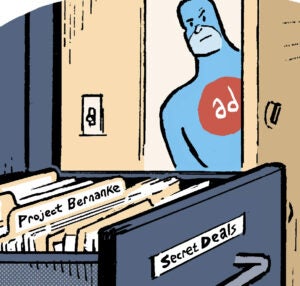Here’s today’s AdExchanger.com news round-up… Want it by email? Sign up here.
New Pals
PayPal officially launched its ads business on Thursday, which is led by Mark Grether, formerly head of Uber Advertising.
It’s still early, but it looks like PayPal Ads will take a more aggressive approach than Shopify, which has also begun monetizing its aggregate purchase data for advertising.
PayPal and Shopify have a broad view of ecommerce. Target and Kroger are huge, but they still only see shopping in their stores.
Shopify, though, has kept advertising at an arm’s length. It doesn’t serve ads across its network of merchants. Instead, Shopify has its own advertising and data unit that distributes anonymized audiences back to walled garden partners – including Meta, TikTok, Pinterest and Google – or to Criteo, its only open programmatic integration.
In other words, Shopify has a managed service layer separating ad platforms from the customer data, and platforms can’t refine campaigns to target specific merchants in Shopify’s network.
But PayPal plans to launch a self-serve product next year, Grether tells Adweek. PayPal will also serve ads itself across retail sites and apps beginning next year. And advertisers will be able to target specific retailers where they want to increase market share, he said.
Brand Safety Dance
It’s not news that most advertisers avoid, well, the news. Their fear of the screenshot-industrial complex is real.
Media buyers are worried that “an advertising mistake can become the news,” said Tracy-Ann Lim, chief media officer at JPMorgan Chase, speaking during an Advertising Week panel in NYC on Thursday.
That mindset has to change. “It’s really important that we encourage marketers to get away from this set-it-and-forget-it overcorrection we all did a couple of years ago,” Lim said. “Revisit those decisions and ask yourself if they’ve aged well.”
No advertiser needs an exclusion list that’s as long as their arm and never gets updated.
“If risk is your motivating driver behind turning down the volume on news or walking away from news, I implore you to revisit it,” Lim said to applause from the audience. “Because risk is everywhere. It just is.”
But the head isn’t always connected to the hands, as in the hands on keyboards.
When the session ended, a publisher who’d been in attendance approached AdExchanger. “You know,” they said, “JPMorgan Chase asked us to avoid political content for one of their new campaigns.”
Really? “Yes,” the publisher said.
Social Safety
Speaking of brand safety, Meta added new and expanded tools to its brand safety and suitability suite of products this week, Ad Age reports.
First up, businesses can now control which Instagram and Facebook profiles their ads appear on. Meta is also testing the ability to turn off comments on ads. (Wonder if this has something to do with that.)
Next, Meta announced an expansion of its partnership with Integral Ad Science, including new content blocklist controls for Feed and Reels. Brands can now use IAS to help manage blocklists and avoid certain categories and subjects.
Meta has made it a priority to invest in tools that give businesses more control and transparency over safety and suitability on its platforms, Samantha Stetson, Meta’s VP of client council and industry trade relations, tells AdExchanger.
“We continue to be really leaned into brand suitability,” Stetson says. “[We’ve] spent the last year in customer immersion sessions getting to the heart of what our advertisers most want in this space.”
New Scope
Scope3, which creates ratings for carbon emissions related to digital media and advertising, raised a $25 million round led by GV, which is Google’s venture capital unit.
Scope3 will also extend its carbon emissions ratings to include AI bandwidth consumption.
“AI and the media industry are soon going to be indistinguishable,” says Brian O’Kelley, Scope3 co-founder and CEO, in the release.
There’s a cynical angle, too, though. O’Kelley was the co-founder and longtime CEO of AppNexus – and now he targets programmatic tech for electricity consumption. Scope3 was founded in 2021, as many big brands and tech companies made decarbonization a priority.
Yet many big advertisers are already trimming their supply chains. Scope3 refers to it as “decarbonizing media,” but what is that if not supply-path optimization?
Google, meanwhile, is in a tight spot. By the company’s own admission, Google’s investments in generative AI and data centers mean it will miss its plans to have net-zero carbon emissions by 2030. So GV has an extra reason to be interested in Scope3’s ratings.
But Wait, There’s More!
Meta drops its appeal against German antitrust regulators and agrees to cut back on “superprofiling” users. [TechCrunch]
X will stop paying creators based on ad revenue and start paying them based on engagement with their content from X Premium subscribers. [Social Media Today]
Inside the “time bomb ticking beneath” the CTV advertising boom. [Variety]
DirecTV announces its own free ad-supported FAST platform, the appropriately named MyFree DirecTV. [Adweek]
Competition and the clock: How Google plans to deflect and delay a historic breakup threat. [FT]
You’re Hired
Kantar Media names Yee Pang as head of measurement strategy in North America. [release]













